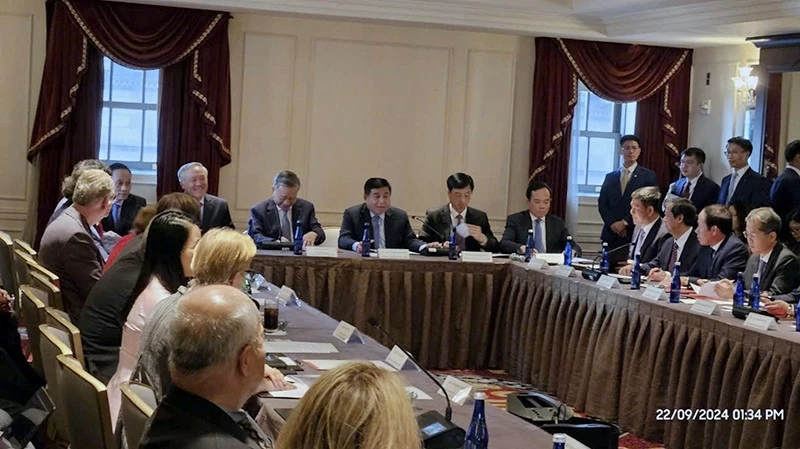
American Investment Firm optimistic about Vietnam’s digital transformation
Latest
 |
| Party General Secretary and State President To Lam met with U.S. investors. |
Interviewer: Mr. Kien, we are happy to see you at this roundtable. Please tell us about your role today.
Mr. Kien: I am here to represent TPG Capital, a leading U.S. investment firm. I have been their senior advisor in Vietnam for the last 17 years. This roundtable was an exciting exchange between the Party General Secretary and State President To Lam and U.S. businesses.
Could you please tell us about the firm's investments in Vietnam?
TPG is currently managing about $230 billion. We began investing in Vietnam in 2006, starting with FPT in technology, followed by Masan in food, CrowX in retail stores and supermarkets, Vietnam Australia International School (VAS) in education, and the Columbia Asia hospitals in healthcare. We are still seeking additional investment opportunities in the country.
Why do you and TPG pay so much attention to the Vietnamese market?
As an international investment firm, we pay special attention to socio-political stability. We believe the government of Vietnam has done a decent job fostering such stability and promoting economic development as the foundation for foreign investors to enter the country. We further believe that the Vietnamese government has done so out of national pride, and we, as investors, benefit from such policies.
The Vietnamese Government is promoting digital transformation. What are your expectations for their success?
The probability of success for Vietnam is high. Over the past 25 years, Vietnam has significantly invested in telecommunications and internet infrastructure, with robust domestic and international connectivity. A very high percentage of the population has access to the internet at meagre costs, much lower than in other countries. This provides a solid foundation for developing a digital economy and society in the coming years. A good example is the recent agreement between Nvidia, the leading AI semiconductor provider, and FPT to launch the first AI Factory in Vietnam. That is a significant achievement for both FPT and Vietnam.
Human resources are crucial for digital transformation. Do you think Vietnam has enough qualified personnel to meet these demands?
Vietnam does not yet have a sufficient workforce in this area. However, over the past 20 years, many universities, such as Vietnam National University, Hanoi; Vietnam National University, Ho Chi Minh City; the University of Danang; the Posts and Telecommunications Institute of Technology; and more recently, FPT University, have trained hundreds of thousands of software engineers. General Secretary Tô Lâm emphasised during the roundtable that Vietnam can continue to train more talent while embarking on this digital transformation, including sending its scholars overseas for training.
What do you think about the role of foreign technology companies in Vietnam?
Companies like Microsoft, Intel, Samsung, and Synopsys have significantly supported training Vietnam's workforce. I believe upcoming companies like Nvidia and Qualcomm will also actively participate in this effort.
Do you have any messages for companies or financial institutions that remain sceptical about the Vietnamese market?
Vietnam's economy is still in the early stages of development, so some outsiders' scepticism is understandable. I encourage those sceptical about talking to credible companies like Microsoft, Facebook, Meta, Google, and Apple to find their answers. In addition, they should look at the dynamism and eagerness for learning by Vietnamese youth to gain a better perspective on the bright future of Vietnam.
Thank you for sharing your insights with us.
| TIN LIÊN QUAN | |
| A significant move in CMC Japan’s development strategy | |
| HCM City bolsters cooperation with Indonesia in technology, green development, digital transformation | |

























